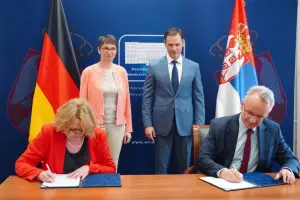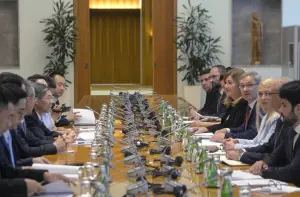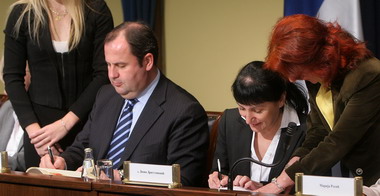- Serbia
Get to know Serbia
- Citizens
Culture and science
Health services
Pension and disability insurance
- Business
Employment
Economy
- Media
- Government
- Contact
Keep in touch
Contact form
Back
Keepin touch
Whether you have a question, comment, suggestion or any problem in the purview of the government, send us your message and we will try to respond as soon as possible. If your problem is not in our purview, we will forward your message to the relevant institution.
Q:
A:
Serbia, Austria remove double taxation
Belgrade,
7 May 2010
Finance Minister Diana Dragutinovic and Austrian Vice Chancellor and Minister of Finance Josef Pröll signed a double taxation avoidance agreement today. The agreement concerns income and property taxes.
Speaking at a press conference after the signing, Dragutinovic said that this agreement will help advance economic and financial cooperation between the two countries as it will make it easier for Serbian citizens to do business in Austria and for Austrian companies to invest in Serbia.
Under this agreement, people and businesses will avoid double taxation, she said, stressing that one of the basic elements of a successful tax system is single taxation, she said.
Multiple taxation is a sign of an inefficient tax system, she said, remarking that Austria is one of the top investors in Serbia.
Since 2000, Austria has invested nearly €2 billion in Serbia. In 2009, despite the global economic crisis, Austria invested €234 million, she said.
Austria is the 39th country with which Serbia has signed a double taxation avoidance agreement. The next step will be the ratification of this agreement by the parliaments of both countries, she said.
Pröll stressed that the signing of this agreement is an important step in economic cooperation between Austria and Serbia.
Austria will continue to invest in Serbia. The finance ministries of the two countries also signed a memorandum of understanding today which will further help improve cooperation, he said.
Dragutinovic confirmed at the press conference that the Serbian government is preparing a set of financial crisis laws which will make it possible to take timely action if the Greek fiscal crisis spreads to Serbia.
This set of laws should be adopted at the July parliament session, the Minister announced explaining that it will be implemented only in case a systemic crisis is declared in Serbia.
She said Serbia will be among the first countries to adopt such a set of laws, which, by amending a Law on banks, a Law on the Deposit Insurance Agency and a Law on deposit insurance, will enable speedier reaction on the part of the state.
The banking sector in Serbia is liquid and capitalised enough, so there is no reason for worrying about the crisis encompassing banks, as well, the Minister said.
She also announced that the 10% tax on the use of mobile phones will be in place until the end of summer at the most, recalling that this is only a temporary measure.
As for reducing excise tax on oil derivatives, Dragutinovic stressed that a portion of budget revenues was projected from the excise tax, therefore this cannot be altered without a budget revision.
Under this agreement, people and businesses will avoid double taxation, she said, stressing that one of the basic elements of a successful tax system is single taxation, she said.
Multiple taxation is a sign of an inefficient tax system, she said, remarking that Austria is one of the top investors in Serbia.
Since 2000, Austria has invested nearly €2 billion in Serbia. In 2009, despite the global economic crisis, Austria invested €234 million, she said.
Austria is the 39th country with which Serbia has signed a double taxation avoidance agreement. The next step will be the ratification of this agreement by the parliaments of both countries, she said.
Pröll stressed that the signing of this agreement is an important step in economic cooperation between Austria and Serbia.
Austria will continue to invest in Serbia. The finance ministries of the two countries also signed a memorandum of understanding today which will further help improve cooperation, he said.
Dragutinovic confirmed at the press conference that the Serbian government is preparing a set of financial crisis laws which will make it possible to take timely action if the Greek fiscal crisis spreads to Serbia.
This set of laws should be adopted at the July parliament session, the Minister announced explaining that it will be implemented only in case a systemic crisis is declared in Serbia.
She said Serbia will be among the first countries to adopt such a set of laws, which, by amending a Law on banks, a Law on the Deposit Insurance Agency and a Law on deposit insurance, will enable speedier reaction on the part of the state.
The banking sector in Serbia is liquid and capitalised enough, so there is no reason for worrying about the crisis encompassing banks, as well, the Minister said.
She also announced that the 10% tax on the use of mobile phones will be in place until the end of summer at the most, recalling that this is only a temporary measure.
As for reducing excise tax on oil derivatives, Dragutinovic stressed that a portion of budget revenues was projected from the excise tax, therefore this cannot be altered without a budget revision.
-
 Belgrade, 11 July 2025
Belgrade, 11 July 2025Potential for improving cooperation with Belarus in many areas
-
 Požega, 5 July 2025
Požega, 5 July 2025Section of Pakovraće - Požega highway officially opened
-
 Belgrade, 2 July 2025
Belgrade, 2 July 2025Technical specifications defined for Serbia-Hungary oil pipeline
-
 Belgrade, 30 June 2025
Belgrade, 30 June 2025IMF confirms Serbia successfully implementing all agreed reforms
-
 Belgrade, 27 June 2025
Belgrade, 27 June 2025Double Taxation Avoidance Agreement with Germany signed
-
 Kostolac, 25 June 2025
Kostolac, 25 June 2025Construction of Kostolac wind farm nearing completion
-
 Belgrade, 24 June 2025
Belgrade, 24 June 2025Government supports request for new postponement of sanctions against NIS
-
 Belgrade, 23 June 2025
Belgrade, 23 June 2025Procedures to facilitate sale of Serbian products to China to be accelerated
-
 Belgrade, 21 June 2025
Belgrade, 21 June 2025Serbia receives first funds under Growth Plan for the Western Balkans
-
 Belgrade/Cairo, 20 June 2025
Belgrade/Cairo, 20 June 2025New phase in relations with Egypt in field of agriculture

